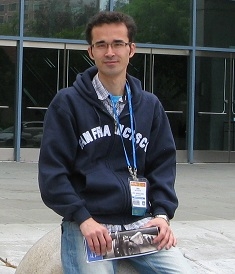Scientists Call for Release of Imprisoned Iranian Physics Student
Two years since the arrest and subsequent imprisonment of Iranian physicist and student Omid Kokabee, scientific societies are redoubling their efforts to secure his release. Students from the University of Texas at Austin (UT Austin) have released a short film about his situation.
“We hope to bring awareness about Omid for the sake of his justice and freedom,” the UT Austin students said in a statement accompanying the video. Another website, freeomid.org , has collected several petitions and open letters which are circulating on Kokabee’s behalf, along with concrete actions concerned people can take to effect change in his situation.
Over the last several months, the publication Nature, the Institute of Physics, the Middle East Studies Association of Tucson, the American Association for the Advancement of Science, the Committee of Concerned Scientists, and Amnesty International, among others, have held events and written letters and petitions demanding Kokabee’s release.
Omid Kokabee, 30, began studying for a PhD in optical physics from the Institute of Photonic Sciences in Catalonia, Spain, in 2007. In 2010, he transferred to UT Austin to continue his studies. During a visit to Iran in February 2011, Kokabee was arrested at the airport on charges of “communicating with a hostile government” and “illegal earnings.” He was convicted and sentenced to 10 years in prison in a brief trial in May 2012 by Judge Abolghassem Salavati—nicknamed “Judge of Death” for his harsh sentences—of Branch 15 of Tehran’s Revolutionary Court.
According to an open letter Kokabee wrote from prison, he alleged that Iranian authorities were attempting to pressure him into “collaborating” with the authorities, and that he had been accused of conspiring with foreign countries against Iran. In a petition sent to the Supreme Leader Ayatollah Khamenei, the Committee of Concerned Scientists wrote, “Some reports indicate that Kokabee might have been suspected in the exchange of information on nuclear technology. As scientists, we can assure you, that his research and studies had nothing to do with nuclear energy. His education and his Ph.D. project are in optics.”







